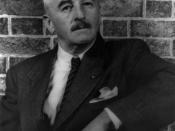After the destruction of the South in the Civil War, the Southern states began what's known now as Reconstruction. Congress established the Freedman's Bureau for the freed slaves in 1865, which offered funds for food, education, protection in labor contracts and local troubles. During 1865-1866 the reorganized southern state governments incorporated a number of acts called Black Codes. These Black Codes were designed to limit the freedom of the freedmen and to keep them as an available labor source in the South. Black Codes denied citizenship, forbade blacks to carry firearms, required that they serve as an apprenticeship while under age, governed their employment, instituted curfews, etc. Around 1877, the end of the Reconstruction period for the South, the little civil rights the freed slaves once had dwindled to a lesser importance and racial tensions began to flare. Through all the racial tension and continued mistreatment several former slaves were forced to continued working for their former masters'.
The majority of these former slaves had living conditions no better than when they were slaves and in some case's worse. In William Faulkner's "A Rose for Emily," Miss Emily Grierson employs a former slave, Tobe, who works for her as a gardener, cook, and an unspoken lifelong friend.
William Faulkner's writing displays Miss Emily as a very prestigious woman, who at her death is considered to be somewhat of a historical fallen monument. She was raised in a time where it was common to believe you were a little better than what you really were. Her father sheltered her while he was alive and she continued to shelter herself after his death. She continued to live her solitary life alone in her deceased father's deteriorating house except for her manservant, Tobe.
Tobe was a former slave of Miss Emily's...


